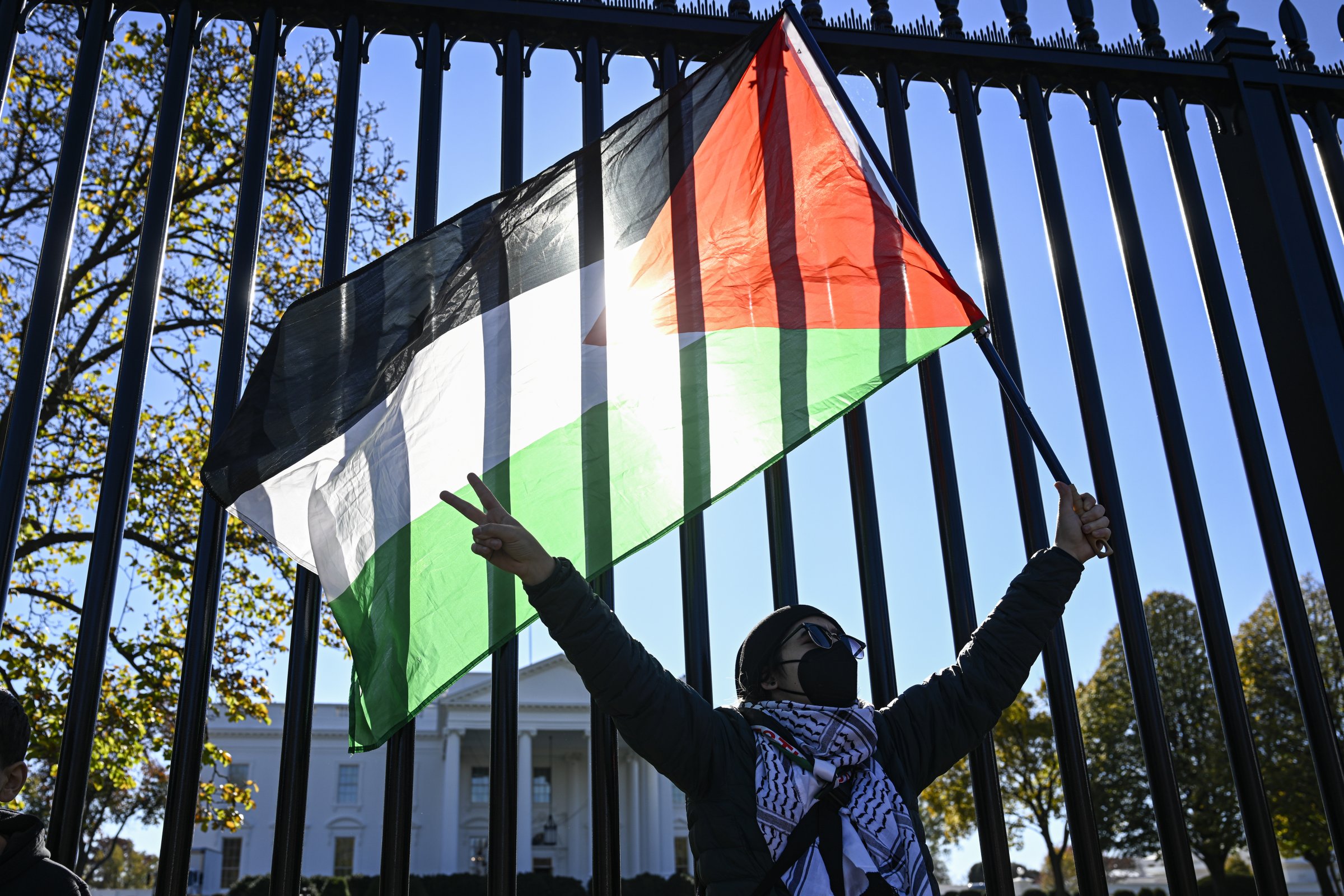
More than a dozen state lawmakers and activists in the U.S.—including actor Cynthia Nixon—have started a hunger strike calling for a permanent ceasefire in Gaza.
The five state lawmakers taking part in the hunger strike beginning Monday are Delaware State Rep. Madinah Wilson-Anton, New York Rep. Zohran Mamdani, Oklahoma Rep. Mauree Turner, Virginia Rep. Sam Rasoul, and Michigan Rep. Abraham Aiyash. They are joined by Nixon and various faith and community leaders.
Mamdani and Wilson-Anton are among the half dozen participants committed to avoiding food for five days. The rest will fast for less than five days. When Wilson-Anton—the Delaware lawmaker—received a call from Mamdani in New York asking if she would consider taking part in a hunger strike, she started crying. She had already been active on social media and participated in protests, but she says she still felt helpless. “I wanted to do something else but I just didn’t know what,” she says.
She hopes the hunger strike will “bring attention to the fact that the U.S. government, our President, and our congressional leaders are funding this policy of starvation.”
“We send American taxpayer money to bomb communities in Gaza and I don’t think our president is using his leverage to the extent that he could to bring about a permanent ceasefire,” she says. “We’re seeing the impact of that, which is no food, no water.”
More From TIME
While a four-day temporary ceasefire between Israel and Hamas began Nov. 24, pro-Palestinian advocates fear that the besieged Gaza strip will face more devastation when it lifts. Israeli attacks have so far killed more than 14,000 Palestinians and decimated the city’s health care system. Palestinians are struggling to find food and clean water because of Israel’s blockade; the UN’s World Food Programme says that Gaza’s civilians face the “immediate possibility of starvation.” Oxfam says starvation is being used as a "weapon of war." Israel’s airstrikes follow an Oct. 7 attack by Hamas, which killed 1,200 people in Israel and took more than 240 hostages. The temporary ceasefire was made to help facilitate the release of 50 Israeli hostages and 150 Palestinian prisoners held by Israel; those freed on both sides are women and children.
Read More: The Struggle to Save Lives Inside Gaza’s Hospitals
Actor and activist Nixon will participate in the hunger strike for two days. Nixon is one of more than 260 artists who previously signed an open letter calling for President Joe Biden and Congress to commit to a ceasefire. Speaking at a press conference outside the White House on Monday, Nixon spoke of high civilian casualties in Gaza. “None of this is normal," she said. "None of this is routine and none of this can be allowed to continue.”
Sumaya Awad, a Palestinian-American activist and director of strategy and communications at Adalah Justice Project, referenced the recent shooting of three Palestinian-American college students in Vermont. “This is what happens when we don’t support a permanent ceasefire and our government continues to dehumanize Palestinians,” she said at the press conference.
Those taking part in the hunger strike say that the U.S.’ should reflect on its unwavering support to Israel and that a pause is insufficient. “The United States is not simply a witness to this genocide. It's an actor in this genocide,” says Mamdani, the New York assembly member. "We are starving ourselves in front of the White House to show President Biden the consequences of his actions. This is what he's doing to Palestinians. it is time that he sees at his doorstep, what it means to support policies such as these."
President Joe Biden is pushing to supply Israel with an additional $14 billion in military aid. The U.S. has dismissed the assertion that Israel is committing genocide. Several genocide experts, as well as three dozen U.N. experts, have argued that there is a serious risk of genocide.
Mamdani notes that many American voters have said they would support a permanent ceasefire, referencing a poll conducted between Oct. 18-19 from leftwing polling firm Data for Progress in which about two-thirds of U.S. voters say they “strongly agree" or "somewhat agree" with the measure. A Reuters/Ipsos poll from mid-November before the temporary ceasefire began found some 68% of respondents said they agreed with a statement that "Israel should call a ceasefire and try to negotiate."
Wilson-Anton is coming up with strategies to fight the hunger, including more resting and checking in with loved ones. But she’s also “trying to keep in perspective how much easier it is to do a hunger strike when you know that there's an end in sight and a fully stocked fridge.”
“I know that I have food that I can eat," she says. "I know that I have clean water that I can drink, whereas Palestinians that are living in Gaza do not have that assurance."
More Must-Reads From TIME
- The 100 Most Influential People of 2024
- Coco Gauff Is Playing for Herself Now
- Scenes From Pro-Palestinian Encampments Across U.S. Universities
- 6 Compliments That Land Every Time
- If You're Dating Right Now , You're Brave: Column
- The AI That Could Heal a Divided Internet
- Fallout Is a Brilliant Model for the Future of Video Game Adaptations
- Want Weekly Recs on What to Watch, Read, and More? Sign Up for Worth Your Time
Write to Sanya Mansoor at sanya.mansoor@time.com